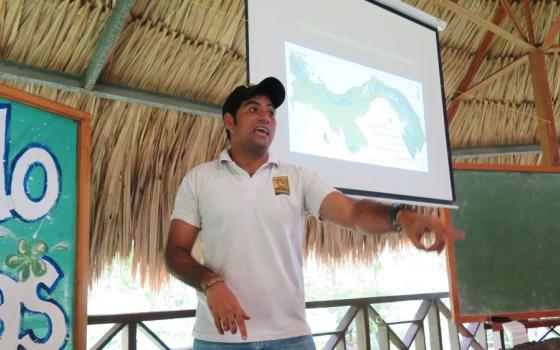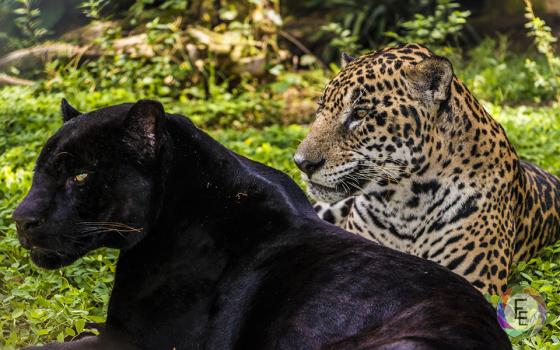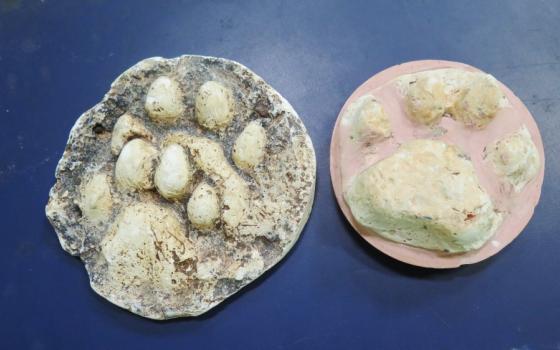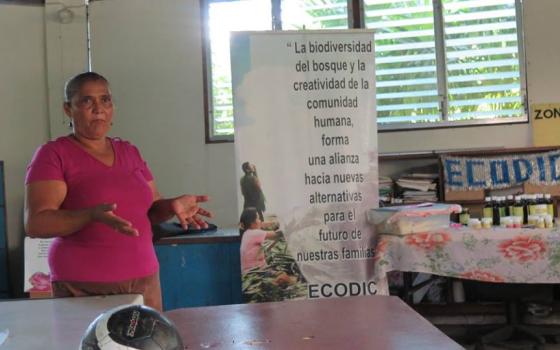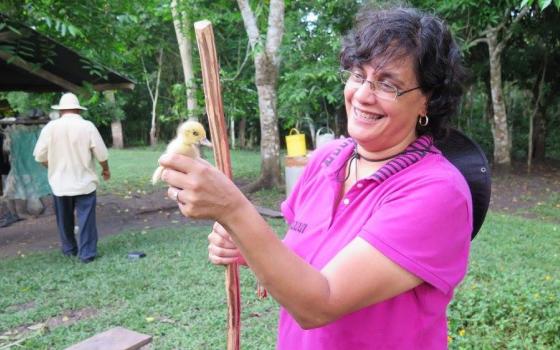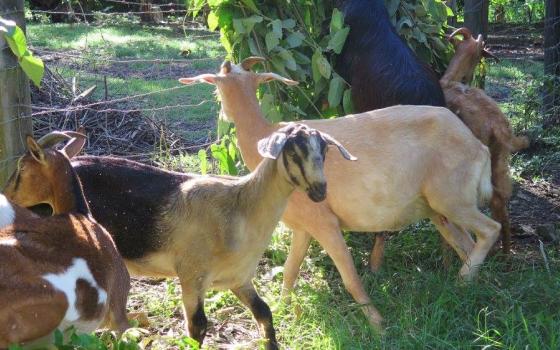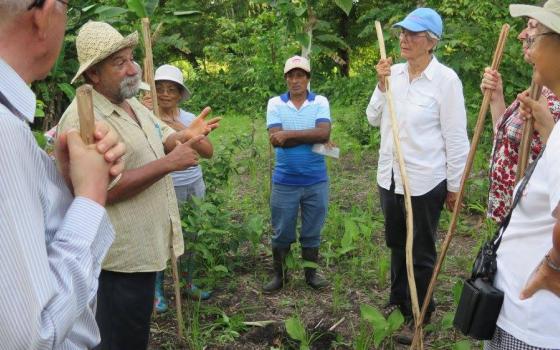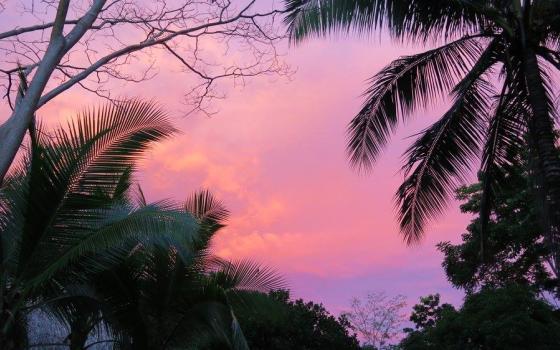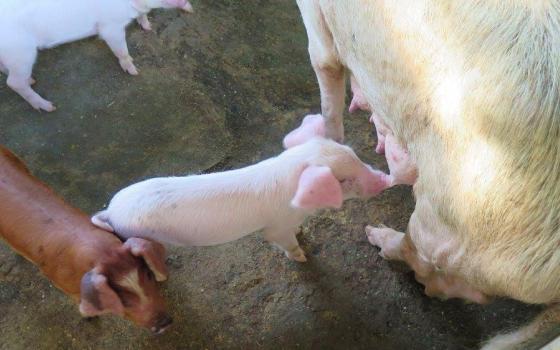"Stargazers, gardeners, teachers are we. Artists and poets and friends — scientists, mystics and lovers of life; standing as one for Earth." — Jan Novotka, Together in This Great Work
Ricardo Moreno is a man in a race against time. The Panamanian biologist's great love is the biggest cat in the Americas, the jaguar, which is being extinguished at a precipitous rate in Panama.
Fresh from Washington, D.C., where earlier this month he received recognition as a National Geographic Emerging Explorers for 2017, Moreno brought an intense energy to the Maryknoll Sisters' Web of Life retreat as he spoke of his lifelong work to save the endangered feline.
"The largest feline we have in America is turning into a phantom," he told the group. "It's becoming exterminated. It seems like it's not real, but it's really real."
Moreno grew up watching National Geographic specials on TV and observing the behavior of his cat, Tao, and its interactions with other neighborhood cats. He became a wildlife biologist and began tracking the giant felines, which were increasingly coming into contact with humans as their habitat was destroyed to make way for agriculture, industry and urban development.
Twenty years ago, when he was just beginning his career, Moreno would see jaguar tracks on the trail of Soberanía National Park near the Panama Canal, and he studied their movements there and in many other places throughout Panama and Costa Rica. Since 2012, however, no tracks have been seen in the park, another indicator of the big cat's decline.
"It's sad for me, but this sadness makes me work harder to try and recover the population over there," he said. "I dream one day I will wake up and walk there and once again see jaguar tracks — and I hope we can do that."
Since 1989, more than 300 jaguars have been killed, Moreno said, and that number is increasing. He estimates there are now fewer than 1,000 remaining in Panama, and if current trends continue, they will be extinct in 25 to 50 years.
He said he quickly realized that working with local people was key to saving the animal. He began a nonprofit, Yaguará Panamá, dedicated to the dual purpose of researching jaguars and working with local people to enlist their help, a challenge he found difficult because for the most part, local farmers and ranchers are the ones who kill the big cats.
Jaguars suffer from a widespread misconception that they kill people, Moreno said. Despite the many rumors and legends, there has never been a documented case of a jaguar killing a person, he said.
Over the years, he's given thousands of talks to people in villages throughout Panama and Costa Rica, and he frequently faces angry and aggressive ranchers and farmers who have lost livestock to the big cats.
"One farmer told me, 'You have to kill them. They're like the devil,' " Moreno said.
In his meetings, he challenges people to share firsthand knowledge of a jaguar killing a human. As the stories emerge, it turns out nobody knows of any cases firsthand: The stories are handed down from generation to generation.
Moreno works with local ranchers to help them find ways to keep their livestock safe from the predators. He also gives them incentives to keep the cats alive, such as a program in which he installs cameras in the forest and sells the photos of the jaguars. Half the proceeds go back to the ranchers; the other half goes to support Yaguará Panamá.
Jaguar tourism is another way the nonprofit supports awareness. A tour called "En Busca de la Huella del Jaguar" ("Search for the Jaguar Footprint") has emerged in Quebrada Ancha, a town on the edge of Chagres National Park, where scouts find the footprints and send tourists to the area where a footprint has been found. Upon finding it, they make a plaster cast, which is sold to raise money to benefit the local community. Moreno's group is working to reproduce this tourism model in other places.
The Web of Life group also learned about ECODIC (Community Team for Integral Christian Development), a nonprofit formed by the Maryknoll Pastoral Center that supports local people in generating income and making products from medicinal plants while also supporting the development of community bonds.
Marcelina Noriega, one of the organization's leaders, spoke of the way farmers have been encouraged to cut down the forest to show that the land is being used. Indeed, there is still a law on the books that says if a piece of land is not being cultivated, someone else can take it over to do so.
"We are trying to change the way we work to take care of the land and respect nature," she said. At the same time, the group is working with producers to help them market their products. "We are good producers, but we are not great businesspeople, and that's not our fault."
A tour of the pastoral center's organic farm provided Web of Life participants a chance to learn about sustainable farming in the tropics, which is filled with challenges. But under the guidance of Amparo Arauz, the center's farm coordinator, it produces food for the center and sells some products, like baby piglets, goat milk, rich composted humus (soil) and bananas.
The farm is small but filled with activity and diverse plant life. The group made its way through the terrain, observing three pigs and a brood of piglets, three cattle and a baby calf, 10 goats with kids on the way, ducklings, chickens, and a wide variety of tree and plant crops.
Arauz talked about the need to pay close attention to the phase of the moon and the tides in planting banana trees, then showed us the rice and corn fields, where the time of year is more important for planting than the time of the month.
Later, in the nightly circle of reflections, Maryknoll Sr. Ann Braudis commented on Arauz's wisdom and knowledge of natural cycles and called it a clear example of "Earth literacy."
"I'm glad you mentioned that," Maryknoll Sr. Melinda Roper said. Arauz, as it turns out, is not literate, but his ability to read the Earth and its cycles is profound.
Clara Meza reflected on Moreno's presentation and its implications for our way of life.
"It makes me think of what hypocrites we are as humans," she said. "We fight the jaguar because it kills cattle, but we ourselves kill the cattle. And now that we see the jaguar in danger of extinction, we rush to save the jaguar. We are eliminating their habitat, and so the poor things have to go raid the ranches. As long as we continue to eat meat and live the way that we do, this will happen. The point seems to be in finding a way to live together, without waiting until the last moment to save the ones who are in danger."
[Tracy L. Barnett is an independent writer, editor and photographer specializing in environmental issues, indigenous rights and sustainable travel.]
